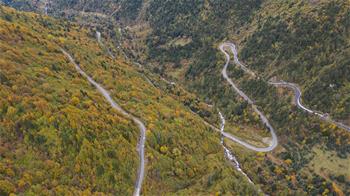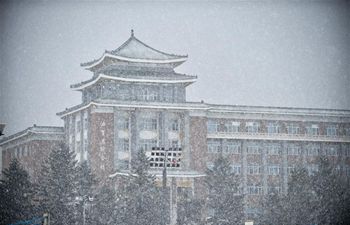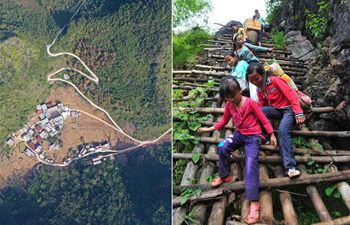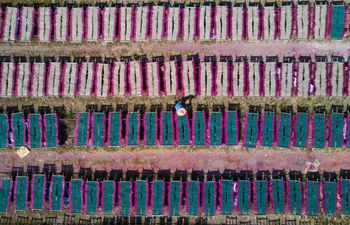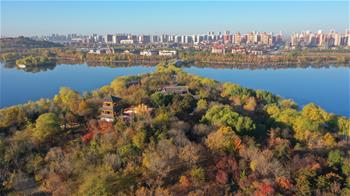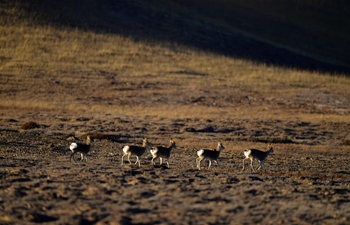CHANGCHUN, Nov. 14 (Xinhua) -- For a dozen days at the turn of July, 63-year-old Zhu Qingzhong and his wife rushed to the river each morning before dawn and worked 17 hours before heading home.
The couple were busy picking cattail pollen, the pollen of cattails as the name suggests, in its original sausage-shaped form. It is a powdered traditional Chinese medicine (when dried) that helps stop internal bleeding and relieve abdominal pain.
"The picking season is short, and we certainly don't want to miss the boat," he said.
Zhu lives in the poverty-stricken Heishan Village of Haituo Township in the western part of northeast China's Jilin Province that suffers from severe land salinization.
The couple worked hard, yet a partial gastrectomy and postsurgical medication for Zhu exhausted their savings in 2011, pushing the family deeper into the mire of poverty.
Thanks to the local government's anti-poverty funds, they were given three sows to raise. Policies on medical aid and children's educational support also helped alleviate their worries.
The family gradually wiped off their debt from medical treatment and started to ponder a money-making future as Zhu got better.
Two years ago, a relative of the family asked Zhu to get some people to pick cattail pollen from a wetland behind the village, and sell the pollen at 3 yuan (about 43 U.S. cents) a kilo.
"No one except me and my wife wanted to do the job since there were very few cattail plants near the village at that time," Zhu recalled.
The wetland, or "Heishan Pond" as it is called by the villagers, is located at the mouth of the Huolin River that flows into Chagan Lake, one of the largest freshwater lakes in China known for its centuries-old tradition of ice-fishing.
Over the past two years, there have been more cattails in the wetland, replacing overgrown reeds. Zhu attributed the increasing plant population to the rising water level of the pond.
Baicheng region, in which Heishan Village is located, was once a lush oasis but suffered due to the deteriorating ecological environment caused by mass land-reclamation.
An improved water network has taken shape in the region over the past few years since the provincial government implemented a project connecting rivers and lakes, bringing Baicheng bumper harvests and a better ecological environment and microclimate.
"The pond benefited from the project due to being in a favorable position, with more aquatic plants and birds," said Zhao Yongfeng, Party chief of Haituo Township.
Zhu earned more than 10,000 yuan picking cattail pollen in less than half a month this year, and his success attracted quite a number of followers in the village, increasing their income by over 400,000 yuan in total.
"This year's purchase price was 6 yuan a kilo," he said. "We're not picking cattail pollen, but cash."
The quick-witted farmer also rented out his yard for drying the pollen to earn extra income, charging 0.8 yuan per kilo.
Yang Jiulong, a Heishan village cadre who is in charge of the poverty-relief work, said women in the village will be trained to make rush straw handicrafts and sell them online.
Zhu and his wife now double up with laughter as they stand to make nearly 50,000 yuan a year with their other income from selling piglets, corn and organically grown millet.
"We've not only got rid of poverty, but become better off," he said.




